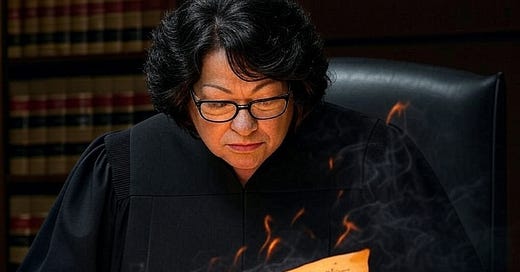Justice Sotomayor Seems to Believe Inclusivity Trumps Constitutional Freedoms
Her thinking isn't just wrong—it's dangerous.
During yesterday’s Supreme Court hearing in Mahmoud v. Taylor, a case that could define the limits of parental rights in public education, Justice Sonia Sotomayor made one of the most sweeping statements of judicial deference to public school policy we’ve seen in years.
A lot of ink has been spilled online about Justice Ketanji Brown Jackson’s line of questioning—particularly where she seems to argue that “we don’t know” children were actually being exposed to the inappropriate, sexually-charged material. She asks this despite the fact that the school district demands it be taught in classrooms (more on this from my RedState colleague Bonchie here). However, while Jackson seems to prove to her detractors that she is out of her depth, Sotomayor is far more willing to destroy constitutional protections in the name of inclusivity.
In her view, the state’s interest in delivering a “cohesive and inclusive” education appears to override religious objections brought by parents who wish to opt their children out of lessons that conflict with their beliefs. But here’s the problem: the Constitution does not place civic harmony above individual liberty, especially not when it comes to the Free Exercise Clause of the First Amendment.
And when a justice effectively argues that ideological uniformity can come at the expense of religious conscience, that’s not judicial restraint—it’s a constitutional sidestep.
Sotomayor’s Overreach: Inclusivity as a Constitutional Override
Throughout the hearing, Justice Sotomayor returned to a recurring theme: that “disruption” to inclusive classroom learning justifies denying opt-outs. At one point, she framed her concern like this:
“If all that's required is exposure, are your clients not asking to override the state's ability to teach inclusivity? Isn't that the disruption the school board is avoiding?”
What Sotomayor is suggesting here is that simply allowing a student to be exempt from a controversial lesson—without altering the curriculum for anyone else—is itself disruptive. That’s a dramatic expansion of what qualifies as a compelling state interest.
It’s also fundamentally at odds with established Free Exercise jurisprudence, which requires that any substantial burden on religious practice be justified by a compelling government interest pursued through the least restrictive means. “Inclusivity” may be a worthy policy goal, but it cannot operate as a constitutional override.
Kagan’s Sharper Framing—But Still Insufficient
I will be straight with you: I have much more respect for Justice Elena Kagan, even as I disagree with her on a good many issues. And, to her credit, she offered a more nuanced pushback to the petitioners during the hearing.
She questioned the petitioners on where opt-out logic might lead—whether parents could object to evolution, racial history, or any number of subjects taught in public schools. Her concern was that, once religious objections are constitutionalized, the floodgates open.
“We don’t see a lot of objections in high schools. We don’t see a lot of objections about evolution classes. Is that true? And should we count on it being true?”
That’s a fair question. But Kagan stops short of explaining why Free Exercise rights must yield entirely to fears of administrative burden or curricular complexity. There’s no reason the Court can’t enforce a standard that protects sincerely held religious objections without granting parents a veto over public education. The key is in how the Court defines “substantial burden,” and whether the state has actually attempted to minimize it.
The Constitutional Line the Court Must Draw
What both Justices miss is that the issue isn’t exposure to controversial ideas—it’s compelled participation. The parents in Mahmoud v. Taylor aren’t asking to change what’s taught to others. They’re asking not to be forced to subject their children to lessons that teach moral frameworks directly opposed to their faith.
That distinction matters. Because if the courts won’t recognize that a parent’s right to opt out—narrowly, in limited instances—is protected by the Free Exercise Clause, then public schools can effectively enforce ideological conformity as long as they call it “inclusive.”
And if that becomes the standard, we’ve elevated the state’s worldview over all others—exactly the scenario the First Amendment was designed to prevent.
Respect for Pluralism Requires Limits on the State
The Supreme Court doesn’t need to undermine public education to protect religious liberty. It simply needs to affirm that the Constitution still applies in classrooms, and that Free Exercise is not a conditional right subject to policy preferences.
Justice Kagan raises difficult, thought-provoking questions. Justice Sotomayor offers a far broader defense of state power. But both ultimately fall short by treating the Free Exercise Clause not as a limit on government action, but as an obstacle to educational policy.
That’s a mistake. If public education is going to serve all Americans, it must respect the deepest convictions of some of them—even when it’s inconvenient to do so.
Let me know if you’d like a condensed version for social media, or a follow-up analysis when the opinion is released.



